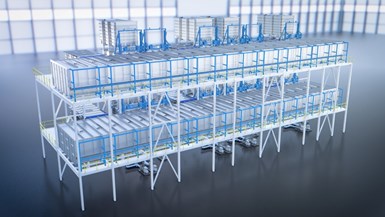Modular Components for Scalable Plant Engineering in the Paint Shop
There are multiple advantages to the process, including minimizing the use of environmentally harmful chemicals and reducing the cost of wastewater treatment.

The EcoProWet PT pretreatment system consists of a space-saving modular chamber instead of large immersion tanks. Photo Credit: Dürr
Dürr is enabling a compact and modular construction method with a system design for pretreatment in the painting process. EcoProWet PT is a flexible and scalable wet system for body pretreatment that takes less space and time to build than traditional immersion tanks. The system saves on energy and materials, and is suitable for small- to medium-production capacities.
In vehicle painting, pretreatment is still one of the process steps that takes up the most space in a plant. This is because the tanks for cleaning and electrocoating are designed for the biggest vehicle body dimensions and for the longest process times in each case. With EcoProWet PT, Dürr has developed a modular pretreatment system that is changing systems for small- and medium-capacities with a scalable, space-saving and sustainable solution.
The first station in the painting process is pretreatment, where vehicle bodies coming through from the body shop are cleaned, degreased and prepared for subsequent coating. The second process step is electrocoating, which applies a primer to the body to protect against corrosion. Previously, the RoDip rotational dip process has been used at Dürr for efficient immersion and draining processes. The EcoProWet PT pretreatment system is an alternative to the established method.
Instead of using large tanks, the system design envisages compact chambers, which are flooded or designed as spray chambers depending on the process step. At the process level, the body is loaded through a roller shutter door into the tunnel on the cross-transfer cars, which bring the body to the respective process chambers. For future series systems, up to five of these cross-transfer cars are planned, which work in previously defined sections and bring the bodies to the chambers.
Like the chambers themselves, all elements of the system have a modular design not only for efficient logistics but also for short assembly and commissioning times during construction. This applies to the tunnel, steel structure, conveyor technology and door that securely seals the flooding chamber. Because of the solid construction, it can withstand the water pressure during flooding or when the chamber is completely full. The optional insulation in the door contributes to the system’s energy efficiency by reducing the amount of heat loss to a minimum.
In the spray chamber, the bodies are treated using a large number of nozzles, which can be directed to different areas and can be flexibly switched on and off according to the size and shape of the bodies. Through this, critical areas, such as door sills, can be reached. A lance with a special rotating nozzle also promotes targeted and efficient cleaning of the interior.
In the flooding chamber, the treatment fluid is fed into the chamber from a buffer tank located above. The resulting momentum further helps to clean the body, and only as much fluid is used as needed for the respective size of the car body. The filtration process to recycle the cleaning fluid takes place in the full volume flow on the way back from the counter tank to the buffer tank.
In series operation, the cycle times and system modules are coordinated with each other in a way that the buffer tank is filled whenever fluid is needed. Because the pumps are likewise controlled in accordance with the actual need, the energy required for them to run can be reduced to a minimum.
The EcoProWet PT pretreatment system is also well suited for thin-film processes. In automotive paint shops, the previously common pretreatment process of zinc phosphating is being replaced by thin-film processes that minimize the use of environmentally harmful chemicals and the cost of wastewater treatment. These thin-film processes have become established on the market and meet the high requirements for corrosion protection.
The system was developed in close cooperation with chemical manufacturers. Together with BASF/Chemetall and Henkel, Dürr has carried out test series to validate the system concept in a purpose-built pilot system. The evaluation of the test results by the chemical suppliers is said to show how well suited the system concept is to modern, environmentally-friendly, thin-film processes. It also confirms the high flexibility of the system, which enables a process design for different substrates and body types. Through the cooperation, Dürr has developed a system that meets the sustainability requirements of future production processes.
Related Content
Vacuum Degreaser Cleans Up a Messy Situation
By replacing its immersion parts washer with a vacuum degreasing system, this machine shop is much more efficient, saving the company money, man hours and the health of the operators.
Read More3-Stage Versus 5-Stage Washers
Columnist Rodger Talbert explains the difference between a five-stage washer and a three-stage washer, and how one provides better corrosion protection over the other.
Read MoreTesting Safe Alternative Conversion Coatings
A joint test protocol was developed by a hex chrome-free consortium to best evaluate the most recent commercially available alternative conversion coatings. This article reveals the findings.
Read MoreClean Technology Lasers for Coating Adhesion
Laser cleaning systems remove corrosion, grease, residue and existing coatings from metal surfaces quickly, with less preparation and mess than traditional techniques.
Read MoreRead Next
Education Bringing Cleaning to Machining
Debuting new speakers and cleaning technology content during this half-day workshop co-located with IMTS 2024.
Read MoreEpisode 45: An Interview with Chandler Mancuso, MacDermid Envio Solutions
Chandler Mancuso, technical director with MacDermid Envio discusses updating your wastewater treatment system and implementing materials recycling solutions to increase efficiencies, control costs and reduce environmental impact.
Read MoreDelivering Increased Benefits to Greenhouse Films
Baystar's Borstar technology is helping customers deliver better, more reliable production methods to greenhouse agriculture.
Read More














.jpg;maxWidth=300;quality=90)










